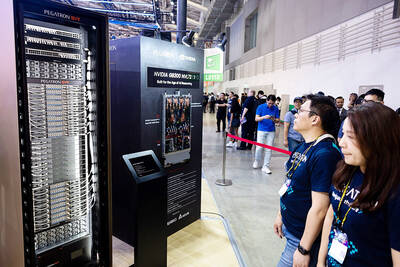As part of its efforts to attract Southeast Asian and Muslim customers, Taipei Garden Hotel (台北花園大酒店) is to host a month-long Malaysian food festival, starting next week.
The hotel hopes the festival, which is to open on Monday and run through May 11, will boost revenue at La Fusion (六國餐廳) buffet restaurant by 10 percent to 20 percent, as well as promote appreciation of Malaysian food, chief food and beverage operating officer Steven Shih (石益鳴) said.
“We agree with the government that the industry should diversify its source of customers and reach out to Southeast Asian and Muslim guests to remain competitive and profitable,” Shih said on the sidelines of a news conference.
La Fusion’s revenue last year totaled NT$80 million (US$2.63 million), Shih said.
The number of travelers from Southeast Asia to Taiwan grew 16.2 percent from 1.42 million to 1.65 million last year, with the number of Malaysian visitors increasing by 20 percent, assistant director of marketing and communication Blythe Chao (趙芝綺) said, adding that those numbers warranted a shift of attention to travelers from Southeast Asia.
Malaysian chef Shahrom B. Sarri last month joined Taipei Garden to lead the food festival, which will highlight 40 popular dishes from different parts of Malaysia.
The Malaysian festival buffet has been priced at NT$699 per person on weekdays and NT$899 per person on weekends.
The hotel has two other restaurants, a lounge bar and several function rooms with food and beverage generating 54.95 percent of its overall revenue in February, Tourism Bureau data showed.
Occupancy rates reached 89.83 percent in February with daily room rates standing at NT$2,064, bureau data showed.
Taipei Garden, part of the Cosmos Hotel & Resorts Group (天成飯店集團), aims to achieve a 90 percent occupancy rate this year, Chao said.
The group, which operates Cosmos Hotel Taipei (台北天成大飯店), Sun Dialogue Hotel (天成文旅-繪日之丘), Bee House (蜂巢) and ICASA (回行旅), is aiming for a 3 percent increase in revenue this year after last year’s flat performance, Chao said.

AI TALENT: No financial details were released about the deal, in which top Groq executives, including its CEO, would join Nvidia to help advance the technology Nvidia Corp has agreed to a licensing deal with artificial intelligence (AI) start-up Groq, furthering its investments in companies connected to the AI boom and gaining the right to add a new type of technology to its products. The world’s largest publicly traded company has paid for the right to use Groq’s technology and is to integrate its chip design into future products. Some of the start-up’s executives are leaving to join Nvidia to help with that effort, the companies said. Groq would continue as an independent company with a new chief executive, it said on Wednesday in a post on its Web

RESPONSE: The Japanese Ministry of Finance might have to intervene in the currency markets should the yen keep weakening toward the 160 level against the US dollar Japan’s chief currency official yesterday sent a warning on recent foreign exchange moves, after the yen weakened against the US dollar following Friday last week’s Bank of Japan (BOJ) decision. “We’re seeing one-directional, sudden moves especially after last week’s monetary policy meeting, so I’m deeply concerned,” Japanese Vice Finance Minister for International Affairs Atsushi Mimura told reporters. “We’d like to take appropriate responses against excessive moves.” The central bank on Friday raised its benchmark interest rate to the highest in 30 years, but Bank of Japan Governor Kazuo Ueda chose to keep his options open rather than bolster the yen,

Even as the US is embarked on a bitter rivalry with China over the deployment of artificial intelligence (AI), Chinese technology is quietly making inroads into the US market. Despite considerable geopolitical tensions, Chinese open-source AI models are winning over a growing number of programmers and companies in the US. These are different from the closed generative AI models that have become household names — ChatGPT-maker OpenAI or Google’s Gemini — whose inner workings are fiercely protected. In contrast, “open” models offered by many Chinese rivals, from Alibaba (阿里巴巴) to DeepSeek (深度求索), allow programmers to customize parts of the software to suit their

Global server shipments are expected to surge to 15 million units next year, from 4 million units this year, with artificial intelligence (AI) servers accounting for about 30 percent, driven by massive capital spending by major cloud service providers, the Market Intelligence and Consulting Institute (MIC) said on Thursday last week. Major cloud service providers — including Google’s parent company Alphabet Inc, Microsoft Corp, Amazon.com Inc and Meta Platforms Inc — are projected to budget US$450 million for capital expenditure next year, up from US$400 million this year, MIC ICT [information and communications technology] Industry Research Center director Edward Lin